|
Brass music
was his life
Why do millions of people love Ernst Mosch's music more than
anything else? This is a basic question. After all, there
are a lot more great wind orchestras in Germany and even Ernst
Mosch's single flute, three clarinets, one trumpet, four tenor
horns, three trombones, two tubas, and a percussionist had
only the usual twelve notes of an octave at hand. So what
was the secret of his success?
Ernst Mosch once said: "Our music is far more than German
'oompah'. We create music shaped by enthusiasm and passion.
Brass music not only without rattling but smooth like a string
band. That makes the difference." When rehearsing a title
he used to tell each musician exactly how to play the notes.
This sometimes aroused heated discussions but in the end they
got this out-standing "Mosch-Sound" - often imitated but never
equalled.
Conducing to the success of this sound were the inimitable
vocals of Ernst Mosch and Franz Bummerl, of Barbara Rosen,
and later Helga Reichel, accompanied by true love for the
homeland an a vital musicality. And last but not least the
congenial arrangements by Frank Pleyer and the short-lived
Gerald Weinkopf: This gifted artist knew how to write tailor-made
arrangements for each and every one of the musicians.
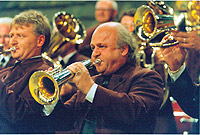 |
Due to the high
quality of the Original Egerlander Musicians he could
create an unique score for every instrument, no part had
to be doubled at all.
This is how they accomplished a multi-layered complexity.
No flimsy "tatara" but a heart-filling and warm sound
softly swinging between the highest and lowest notes. |
| Ferenc Aszodi |
|
|
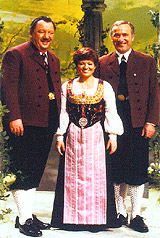 Ernst Mosch with Barbara Rosen
and Franz Bummerl
Ernst Mosch with Barbara Rosen
and Franz Bummerl
|
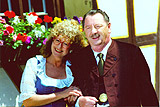 Singing duet with Helga Reichel
Singing duet with Helga Reichel
|
|
|
To this day, that sound, played live and with original lineup
even in the recording studio, gives people a cheering feeling.
With his immense musicality Ernst Mosch easily could realize
his many ideas' full potential. He recorded operetta and film
melodies, played a "Polka-Swing-Parade", and he published
gutter songs in his editions of "Strassenmusikanten", which
in German means "buskers".
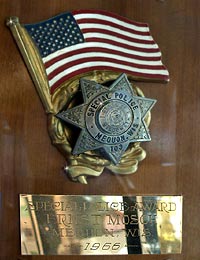 |
With his swinging rhythm
he earned an overwhelming success on his 1966 United States
Tour: Sold-out tickets in St. Louis, Missouri, and Chicago,
Illinois, a jammed New York Carnegie Hall, a "Special
Police Award" from the Mequon, Wisconsin, Police Department
and enthusiastic reviews which gave him the title "Most
Famous Brass Band of the World". |
Special Police
Award
Ernst Mosch
Mequon, Wisconsin
1966 |
In 2001 Gerhard Schilling, editor at Hesse Broadcast, raved
in the catalogue foreword:
"Yet in his lifetime Ernst Mosch was a legend, a monument
of brass music culture and furthermore he was an extremely
vital source of inspiration for young and young at heart
musicians of various entertainment sectors. Again and again
the former big-band jazz player delivered high quality brass
music for the heart and the soul which was interpreted with
softly swinging finesse by his orchestra.
Like no one else he was able to create an astonishing balance
between expressive moments and emotional cantilenas that
got under the skin. His sound was full, smooth, and facetted
like a superb wine, matured in an old Barrique. In his music
light-hearted wind-band tradition met desire and passion.
His unique feeling for the right titles and his elaborate
arrangements and productions earned him decoration after
decoration, filled the biggest concert halls in the world
and made him an icon of national and international music
business, placing him on the same level with the most prestigious
pop stars.
It was a quite natural consequence that with an appropriate
styling of each song and a good dash of nostalgia the Original
Egerlander Musicians hit the charts time and again - you
can call them Chartbreaker."
Ernst Mosch himself had a considerably less poetical explanation
for his music's success: "It's all true. The audience can
feel this. Our waltzes, polkas and marches go straight to
the heart. It's that simple ...!"
|
|
|
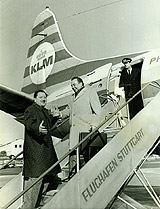 May 1966:
Departing at Stuttgart, Germany, airport for the "Great
American Tour"
May 1966:
Departing at Stuttgart, Germany, airport for the "Great
American Tour"
|
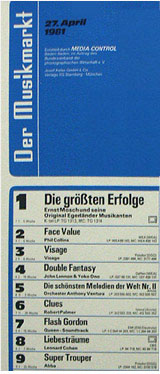 1981 Charts: Ernst Mosch number
1, better than famous ABBA and "Super Trouper"
(ninth place)
1981 Charts: Ernst Mosch number
1, better than famous ABBA and "Super Trouper"
(ninth place)
(please click for a bigger view) |
|